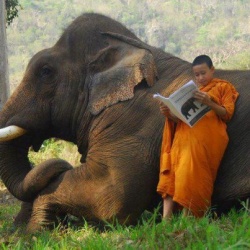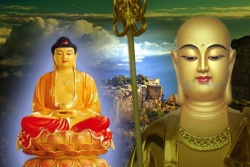Saṅghādisesa
Saṅghādisesa: Rules entailing an initial and subsequent meeting of the Sangha
1. Intentional emission of semen, except while dreaming, entails initial and subsequent meetings of the Community.
2. Should any bhikkhu, overcome by lust, with altered mind, engage in bodily contact with a woman, or in holding her hand, holding a lock of her hair, or caressing any of her limbs, it entails initial and subsequent meetings of the Community.
3. Should any bhikkhu, overcome by lust, with altered mind, address lewd words to a woman in the manner of young men to a young woman alluding to sexual intercourse, it entails initial and subsequent meetings of the Community.
4. Should any bhikkhu, overcome by lust, with altered mind, speak in the presence of a woman in praise of ministering to his own sensuality thus: "This, sister, is the foremost ministration, that of ministering to a virtuous, fine-natured follower of the celibate life such as myself with this act" — alluding to sexual intercourse — it entails initial and subsequent meetings of the Community.
5. Should any bhikkhu engage in conveying a man's intentions to a woman or a woman's intentions to a man, proposing marriage or paramourage — even if only for a momentary liaison — it entails initial and subsequent meetings of the Community.
6. When a bhikkhu is having a hut built from (gains acquired by) his own begging — having no sponsor and destined for himself — he is to have it built to the standard measurement. Here the standard is this: twelve spans, using the sugata span, in length (measuring outside); seven in width, (measuring) inside. Bhikkhus are to be assembled to designate the site. The site the bhikkhus designate should be without disturbances and with adequate space. If the bhikkhu should have a hut built from his own begging on a site with disturbances and without adequate space, or if he should not assemble the bhikkhus to designate the site, or if he should have the standard exceeded, it entails initial and subsequent meetings of the Community.
7. When a bhikkhu is having a large dwelling built — having a sponsor and destined for himself — he is to assemble bhikkhus to designate the site. The site the bhikkhus designate should be without disturbances and with adequate space. If the bhikkhu should have a large dwelling built on a site with disturbances and without adequate space, or if he should not assemble the bhikkhus to designate the site, it entails initial and subsequent meetings of the Community.
8. Should any bhikkhu — corrupt, aversive, disgruntled — charge a bhikkhu with an unfounded case entailing defeat, (thinking), "Perhaps I may bring about his fall from this celibate life," then regardless of whether or not he is cross-examined on a later occasion, if the issue is unfounded and the bhikkhu confesses his aversion, it entails initial and subsequent meetings of the Community.
9. Should any bhikkhu — corrupt, aversive, disgruntled — using as a mere ploy an aspect of an issue that pertains otherwise, charge a bhikkhu with a case entailing defeat, (thinking), "Perhaps I may bring about his fall from this celibate life," then regardless of whether or not he is cross-examined on a later occasion, if the issue pertains otherwise, an aspect used as a mere ploy, and the bhikkhu confesses his aversion, it entails initial and subsequent meetings of the Community.
10. Should any bhikkhu agitate for a schism in a united Community, or should he persist in taking up an issue conducive to schism, the bhikkhus are to admonish him thus: "Do not, venerable sir, agitate for a schism in a united Community or persist in taking up an issue conducive to schism. Let the venerable one be reconciled with the Community, for a united Community, on courteous terms, without dispute, with a common recitation, dwells in peace."
And should that bhikkhu, thus admonished by the bhikkhus, persist as before, the bhikkhus are to rebuke him up to three times for the sake of relinquishing that. If while being rebuked up to three times he relinquishes that, that is good. If he does not relinquish (that), it entails initial and subsequent meetings of the Community.
11. Should bhikkhus — one, two, or three — who are followers and partisans of that bhikkhu, say, "Do not, venerable sirs, admonish that bhikkhu in any way. He is an exponent of the Dhamma. He is an exponent of the Vinaya. He acts with our consent and approval. He knows, he speaks for us, and that is pleasing to us," the bhikkhus are to admonish them thus: "Do not say that, venerable sirs. That bhikkhu is not an exponent of the Dhamma and he is not an exponent of the Vinaya. Do not, venerable sirs, approve of a schism in the Community. Let the venerable ones' (minds) be reconciled with the Community, for a united Community, on courteous terms, without dispute, with a common recitation, dwells in peace."
And should those bhikkhus, thus admonished by the bhikkhus, persist as before, the bhikkhus are to rebuke them up to three times for the sake of relinquishing that. If while being rebuked up to three times they relinquish that, that is good. If they do not relinquish (that), it entails initial and subsequent meetings of the Community.
12. In case a bhikkhu is by nature difficult to admonish — who, when being legitimately admonished by the bhikkhus with reference to the training rules included in the (Pāṭimokkha) recitation, makes himself unadmonishable, (saying,) "Do not, venerable ones, say anything to me, good or bad; and I won't say anything to the venerable ones, good or bad. Refrain, venerable ones, from admonishing me" — the bhikkhus are to admonish him thus: "Let the venerable one not make himself unadmonishable. Let the venerable one make himself admonishable. Let the venerable one admonish the bhikkhus in accordance with what is right, and the bhikkhus will admonish the venerable one in accordance with what is right; for it is thus that the Blessed One's following is nurtured: through mutual admonition, through mutual rehabilitation."
And should that bhikkhu, thus admonished by the bhikkhus, persist as before, the bhikkhus are to rebuke him up to three times for the sake of relinquishing that. If while being rebuked up to three times he relinquishes that, that is good. If he does not relinquish (that), it entails initial and subsequent meetings of the Community.
13. In case a bhikkhu living in dependence on a certain village or town is a corrupter of families, a man of depraved conduct — whose depraved conduct is both seen and heard about, and the families he has corrupted are both seen and heard about — the bhikkhus are to admonish him thus: "You, venerable sir, are a corrupter of families, a man of depraved conduct. Your depraved conduct is both seen and heard about, and the families you have corrupted are both seen and heard about. Leave this monastery, venerable sir. Enough of your staying here."
And should that bhikkhu, thus admonished by the bhikkhus, say about the bhikkhus, "The bhikkhus are biased through favoritism, biased through aversion, biased through delusion, biased through fear, in that for this sort of offense they banish some and do not banish others," the bhikkhus are to admonish him thus: "Do not say that, venerable sir. The bhikkhus are not biased through favoritism, are not biased through aversion, are not biased through delusion, are not biased through fear. You, venerable sir, are a corrupter of families, a man of depraved conduct. Your depraved conduct is both seen and heard about, and the families you have corrupted are both seen and heard about. Leave this monastery, venerable sir. Enough of your staying here."
And should that bhikkhu, thus admonished by the bhikkhus, persist as before, the bhikkhus are to rebuke him up to three times for the sake of relinquishing that. If while being rebuked up to three times he relinquishes that, that is good. If he does not relinquish (that), it entails initial and subsequent meetings of the Community.
Source
http://www.accesstoinsight.org/tipitaka/vin/sv/bhikkhu-pati.html



